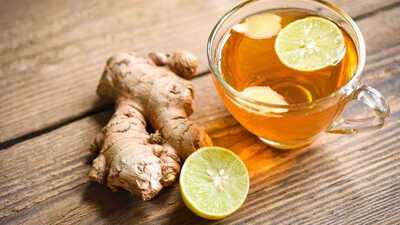Headaches can strike at any time, often triggered by stress, dehydration, poor posture, or hormonal fluctuations. While over-the-counter painkillers may offer quick relief, they aren’t always the gentlest solution for frequent discomfort. Herbal teas, on the other hand, provide a soothing and natural alternative that helps calm the body and mind. Rich in antioxidants and anti-inflammatory compounds, certain teas can help ease tension, improve circulation, and support relaxation, all of which contribute to reducing headache pain. Whether you prefer the warming spice of ginger, the floral calm of chamomile, or the refreshing coolness of peppermint, these teas can bring comfort while supporting overall well-being. Here are seven natural brews that may help relieve headaches and promote better balance in your daily life.
Soothe headaches naturally with these 7 healing herbal teas
Ginger tea

Ginger tea, made from the root of the Zingiber officinale plant, is a powerful natural remedy for headaches. It contains anti-inflammatory and antioxidant compounds such as gingerols and shogaols, which help ease pain and reduce inflammation, two key triggers of migraine discomfort. Drinking ginger tea can also relieve nausea, a common symptom that often accompanies headaches.
Video
According to a study published in the Journal of Food and Nutrition Research, ginger’s active components, gingerols and shogaols, were found to possess significant antioxidant and anti-inflammatory effects that help reduce oxidative stress and pain-related inflammation, supporting its role in natural headache relief. Its warming and aromatic flavour promotes better circulation and digestion, helping relieve tension and pressure in the head. A cup of freshly brewed ginger tea at the first sign of pain can provide soothing comfort while supporting overall immunity and wellness.
Chamomile tea

Chamomile tea is widely known for its relaxing and calming qualities. It contains plant-based compounds with gentle anti-inflammatory and sedative properties that help reduce muscle tightness and stress, both common causes of headaches. According to a study published in the National Library of Medicine (PMC), chamomile contains the flavonoid apigenin, which binds to benzodiazepine receptors in the brain to produce mild sedative and anti-anxiety effects. This action helps calm the nervous system, reduce stress, and improve sleep quality, factors that often contribute to tension headaches.
Willow bark tea
Willow bark, often called “nature’s aspirin,” has been used for centuries as a natural pain reliever. It contains salicin, a compound that converts to salicylic acid in the body, the same active ingredient found in aspirin. This makes willow bark tea an effective traditional remedy for easing pain and inflammation.
It can be particularly helpful for headaches linked to tension, inflammation, or muscle strain. However, those who are allergic to aspirin or prone to bleeding should avoid willow bark and consult a healthcare professional before use.
Feverfew tea

Feverfew tea is prepared from the leaves and flowers of the Tanacetum parthenium plant. This herbal tea has long been valued for its ability to reduce the frequency and severity of migraines. The active compound parthenolide in feverfew helps relax blood vessels and prevent the constriction that can trigger headache pain.
Drinking feverfew tea regularly may help prevent migraines and improve overall circulation to the brain. However, it’s best avoided during pregnancy and by individuals allergic to plants in the daisy family, such as ragweed or marigold.
Clove tea
Clove tea, made from the dried flower buds of the Syzygium aromaticum tree, is another aromatic and therapeutic option for easing headaches. Cloves contain eugenol, a natural compound with strong anti-inflammatory and pain-relieving properties that help block pain signals and reduce discomfort.
The warm, spicy aroma of clove tea also promotes relaxation, helping to ease stress-related tension in the body. A freshly brewed cup can calm both the mind and the senses, making it a comforting choice when headaches strike. However, it’s best consumed in moderation, as excessive amounts may irritate the stomach.
Lavender tea
Lavender tea, brewed from the fragrant blossoms of the Lavandula angustifolia plant, is known for its calming scent and relaxing effects. It helps reduce stress, ease anxiety, and promote better sleep, factors that often contribute to headache relief.
Lavender’s soothing aroma can also help ease tension headaches and migraines triggered by emotional stress. Enjoying lavender tea before bedtime or during a busy day can help quiet the mind and encourage a sense of calm, reducing the likelihood of stress-induced headaches.
Peppermint tea
Peppermint tea, made from Mentha piperita leaves, is one of the most refreshing natural remedies for headache relief. It contains menthol, a compound that helps relax muscles, cool the body, and improve blood circulation. This effect helps release tension in the head and neck muscles, making it ideal for tension or sinus headaches.
Peppermint tea also supports healthy digestion and can reduce nausea or bloating, which sometimes accompany headaches. Its fresh, invigorating flavour and soothing properties make it an excellent choice for both relaxation and natural pain relief.
When to seek medical help for headaches
Most herbal teas are safe for regular use, but it’s important to be mindful of individual sensitivities or interactions with medications. Ginger and peppermint teas are generally safe and well-tolerated. Willow bark should be avoided by children, pregnant individuals, and anyone allergic to aspirin. Feverfew and chamomile should be used cautiously by those taking blood-thinning medication or with known plant allergies. Always speak to a healthcare provider before adding herbal teas to your routine, particularly if you’re pregnant, breastfeeding, or managing a medical condition.
While herbal teas can offer soothing relief, persistent or severe headaches may signal an underlying health issue. Seek immediate medical attention if you experience sudden or intense pain, vision changes, slurred speech, confusion, fever, or dizziness. Frequent headaches that disrupt daily life should also be evaluated by a healthcare professional to identify the cause and ensure proper treatment.
Incorporating herbal teas such as ginger, chamomile, and peppermint into your daily routine can be an effective and natural way to manage headaches. These teas not only relieve pain but also reduce stress, promote relaxation, and support better sleep, helping you maintain a calmer, healthier balance in everyday life.
Disclaimer: This article is for general informational purposes only and is not a substitute for professional medical advice, diagnosis, or treatment. Always seek the guidance of a qualified healthcare provider regarding any medical condition or lifestyle change.
Also Read: Coffee mistakes to avoid: 4 common add-ins that secretly damage your health
Soothe headaches naturally with these 7 healing herbal teas
Ginger tea

Ginger tea, made from the root of the Zingiber officinale plant, is a powerful natural remedy for headaches. It contains anti-inflammatory and antioxidant compounds such as gingerols and shogaols, which help ease pain and reduce inflammation, two key triggers of migraine discomfort. Drinking ginger tea can also relieve nausea, a common symptom that often accompanies headaches.
Video
According to a study published in the Journal of Food and Nutrition Research, ginger’s active components, gingerols and shogaols, were found to possess significant antioxidant and anti-inflammatory effects that help reduce oxidative stress and pain-related inflammation, supporting its role in natural headache relief. Its warming and aromatic flavour promotes better circulation and digestion, helping relieve tension and pressure in the head. A cup of freshly brewed ginger tea at the first sign of pain can provide soothing comfort while supporting overall immunity and wellness.
Chamomile tea
Chamomile tea is widely known for its relaxing and calming qualities. It contains plant-based compounds with gentle anti-inflammatory and sedative properties that help reduce muscle tightness and stress, both common causes of headaches. According to a study published in the National Library of Medicine (PMC), chamomile contains the flavonoid apigenin, which binds to benzodiazepine receptors in the brain to produce mild sedative and anti-anxiety effects. This action helps calm the nervous system, reduce stress, and improve sleep quality, factors that often contribute to tension headaches.
Willow bark tea
Willow bark, often called “nature’s aspirin,” has been used for centuries as a natural pain reliever. It contains salicin, a compound that converts to salicylic acid in the body, the same active ingredient found in aspirin. This makes willow bark tea an effective traditional remedy for easing pain and inflammation.
It can be particularly helpful for headaches linked to tension, inflammation, or muscle strain. However, those who are allergic to aspirin or prone to bleeding should avoid willow bark and consult a healthcare professional before use.
Feverfew tea
Feverfew tea is prepared from the leaves and flowers of the Tanacetum parthenium plant. This herbal tea has long been valued for its ability to reduce the frequency and severity of migraines. The active compound parthenolide in feverfew helps relax blood vessels and prevent the constriction that can trigger headache pain.
Drinking feverfew tea regularly may help prevent migraines and improve overall circulation to the brain. However, it’s best avoided during pregnancy and by individuals allergic to plants in the daisy family, such as ragweed or marigold.
Clove tea
Clove tea, made from the dried flower buds of the Syzygium aromaticum tree, is another aromatic and therapeutic option for easing headaches. Cloves contain eugenol, a natural compound with strong anti-inflammatory and pain-relieving properties that help block pain signals and reduce discomfort.
The warm, spicy aroma of clove tea also promotes relaxation, helping to ease stress-related tension in the body. A freshly brewed cup can calm both the mind and the senses, making it a comforting choice when headaches strike. However, it’s best consumed in moderation, as excessive amounts may irritate the stomach.
Lavender tea
Lavender tea, brewed from the fragrant blossoms of the Lavandula angustifolia plant, is known for its calming scent and relaxing effects. It helps reduce stress, ease anxiety, and promote better sleep, factors that often contribute to headache relief.
Lavender’s soothing aroma can also help ease tension headaches and migraines triggered by emotional stress. Enjoying lavender tea before bedtime or during a busy day can help quiet the mind and encourage a sense of calm, reducing the likelihood of stress-induced headaches.
Peppermint tea
Peppermint tea, made from Mentha piperita leaves, is one of the most refreshing natural remedies for headache relief. It contains menthol, a compound that helps relax muscles, cool the body, and improve blood circulation. This effect helps release tension in the head and neck muscles, making it ideal for tension or sinus headaches.
Peppermint tea also supports healthy digestion and can reduce nausea or bloating, which sometimes accompany headaches. Its fresh, invigorating flavour and soothing properties make it an excellent choice for both relaxation and natural pain relief.
When to seek medical help for headaches
Most herbal teas are safe for regular use, but it’s important to be mindful of individual sensitivities or interactions with medications. Ginger and peppermint teas are generally safe and well-tolerated. Willow bark should be avoided by children, pregnant individuals, and anyone allergic to aspirin. Feverfew and chamomile should be used cautiously by those taking blood-thinning medication or with known plant allergies. Always speak to a healthcare provider before adding herbal teas to your routine, particularly if you’re pregnant, breastfeeding, or managing a medical condition.
While herbal teas can offer soothing relief, persistent or severe headaches may signal an underlying health issue. Seek immediate medical attention if you experience sudden or intense pain, vision changes, slurred speech, confusion, fever, or dizziness. Frequent headaches that disrupt daily life should also be evaluated by a healthcare professional to identify the cause and ensure proper treatment.
Incorporating herbal teas such as ginger, chamomile, and peppermint into your daily routine can be an effective and natural way to manage headaches. These teas not only relieve pain but also reduce stress, promote relaxation, and support better sleep, helping you maintain a calmer, healthier balance in everyday life.
Disclaimer: This article is for general informational purposes only and is not a substitute for professional medical advice, diagnosis, or treatment. Always seek the guidance of a qualified healthcare provider regarding any medical condition or lifestyle change.
Also Read: Coffee mistakes to avoid: 4 common add-ins that secretly damage your health
You may also like

Dubai Ruler Sheikh Mohammed highlights holistic education as foundation for future UAE leaders

'One-Stop Centre' providing lifeline to women victims of violence in Chamoli

Moment Liz Truss tears Rachel Reeves excuses to shreds: 'Utter b*******!'

"Bundle of lies": Union Minister Giriraj Singh slams Mahagathbandhan's manifesto

"Everyone gives advice, but funds are necessary": DK Shivakumar after meeting with BJP MP Tejasvi Surya






